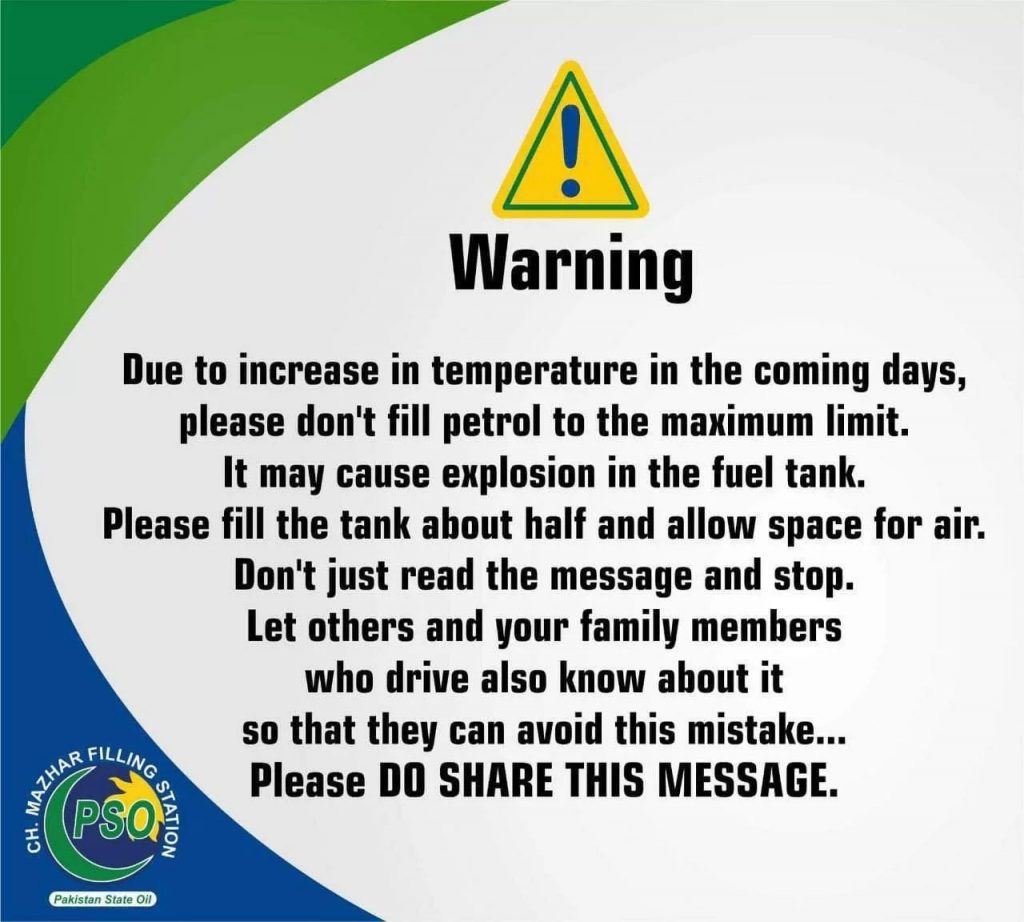Zimbabwe has been experiencing a particularly hot heat wave lately and unsurprisingly a familiar automotive safety tip has been making it’s way around the internet again. This particular tip purportedly from the Pakistan State Oil company states not to fill up your fuel tank as the extreme heat and pressure build up could cause your car to explode.
The Claim

This particular message actually dates back to 2018 and fact-check website Snopes notes that the message originally began circulating in 2015 and was attributed (again falsely) to Adnoc Distribution in the Middle East. Both companies swiftly debunked the fake messages, but time and time again they still make the rounds in the summer.
Why it’s a hoax
Besides being debunked by both companies, there are two very simple reasons why this is simply false.
Firstly the auto-ignition temperature (the temperature at which petrol will just burst into flames without a spark or flame) is over 250 degrees Celcius. Temperatures at which, exploding fuel tanks will be the least of our worries.
Secondly vehicles have had various mechanisms to vent pressure in the fuel tank. Up to the 70’s this was usually a vented fuel cap and when emissions regulations changed, systems were mandated to relieve pressure in the tank without venting to atmosphere.
Summer tips for your car
Make sure your tyres are properly inflated.
Tyres that are under-inflated will build up heat, and that overheat can increase the chances of a tyre blowing out. As we know all too well, this can have fatal results. Even brand new tyres will lose pressure over time so check your pressures at least once a month. Ideally you will want to check your pressure in the mornings before you have driven the car to give you the most accurate reading. The recommended tyre pressure for you vehicle will usually be found in the drivers door jamb or some sometimes fuel cap, that is if you do not have the owner’s manual for your vehicle.
Keep fluids topped up.
Make sure to regularly check your cars fluids as these provide vital lubrication as well as cooling to various components. When fluid levels are low components can overheat and fail, leaving you stranded. Also make sure to top off low fluids with the specified types. When it comes to the radiator whilst water is great for removing heat for the engine, anti-freeze/coolant also helps inhibit corrosion in the engine. It’s best to use distilled water as it does not have any minerals that could cause corrosion. Never remove the radiator cap while the engine is hot, as it will be under pressure and can cause burns.
Check rubber hoses & belts.
To make sure all those topped off fluids are doing their job properly, check the belts and hoses for wear and tear as heat tends to perish rubber hoses and cause belts to crack. A leaking hose or a snapped belt can lead to catastrophic damage if left unattended.
Getting your car ready for summer is a relatively simple affair, a few simple checks that can be done at home as well as regular maintenance should provide you with trouble-free summer driving.